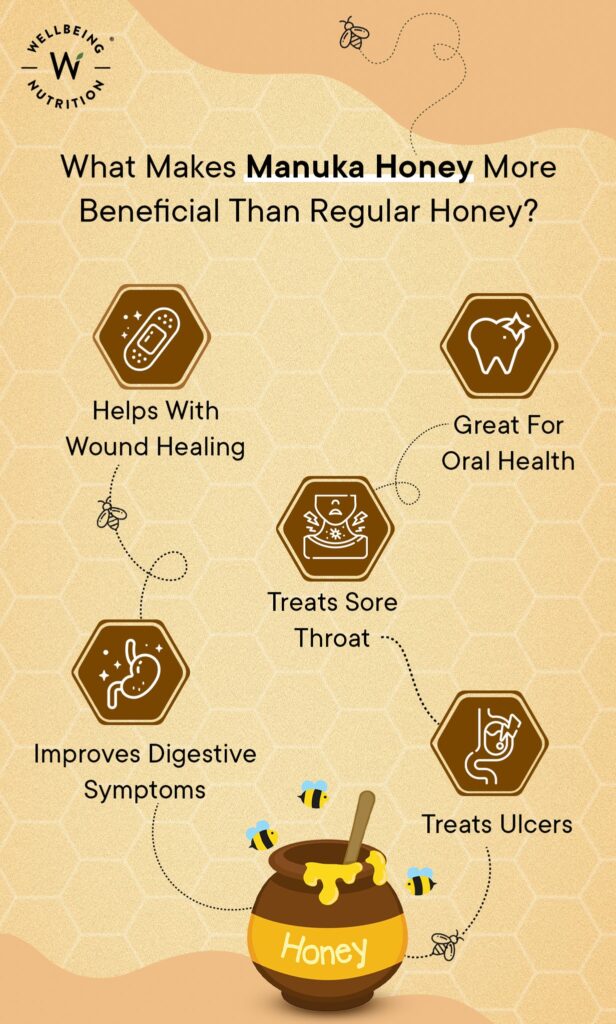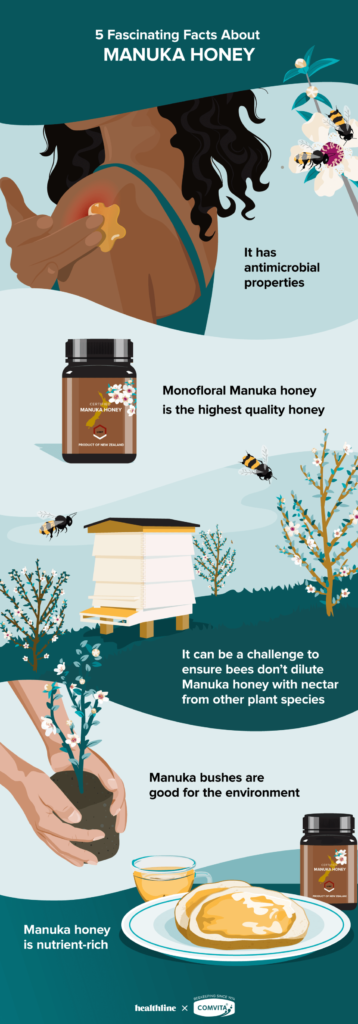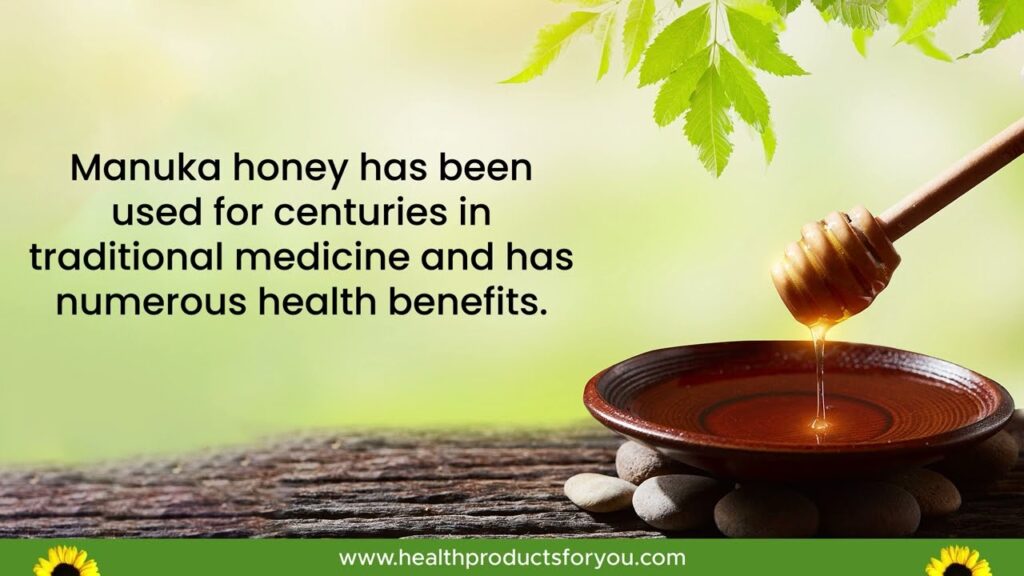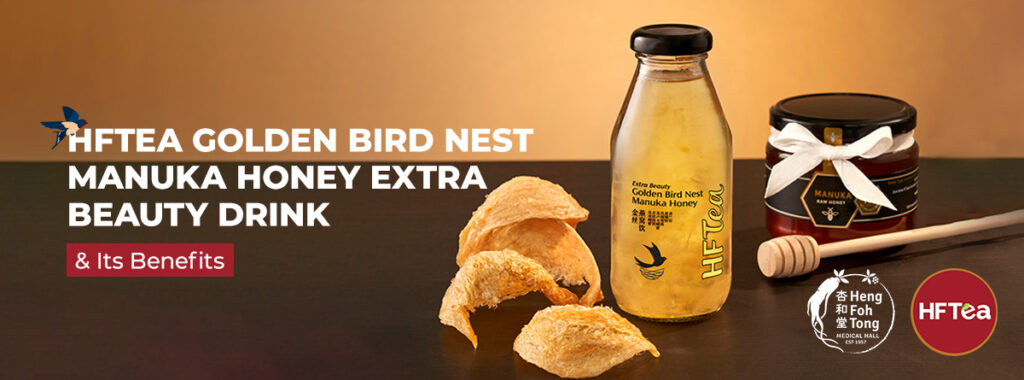
Have you ever wondered about the incredible benefits of Manuka honey? Look no further! In this article, you will explore the wide array of advantages that this special type of honey offers. From its remarkable antibacterial properties to its potential skin-healing abilities, Manuka honey has become a beloved natural remedy for various ailments. Whether you are seeking to boost your immune system or improve your overall well-being, Manuka honey might just be the golden elixir you’ve been searching for. So, let’s delve into the world of Manuka honey and uncover the wonders it holds.
What is Manuka Honey?
Manuka honey is a unique type of honey that is highly valued for its numerous health benefits. It is a special variety of honey that comes from the nectar of the Manuka bush, which is a native plant of New Zealand. Manuka honey has gained popularity in recent years due to its exceptional antibacterial properties and its ability to promote overall health and well-being.
Definition of Manuka Honey
Manuka honey is a monofloral honey, meaning it is made predominantly from the nectar of the Manuka bush (Leptospermum scoparium). What sets Manuka honey apart from other types of honey is its high concentration of methylglyoxal (MGO). Methylglyoxal is a compound that is believed to be responsible for many of the unique health benefits of Manuka honey.
Origin of Manuka Honey
Manuka honey originates from New Zealand, where the Manuka bush is endemic. The Manuka bush grows in the wild, mostly in remote and untouched areas, which contributes to the purity and quality of the honey produced. The bees collect nectar from the Manuka flowers and produce the honey in their hives. The pristine environment and rich floral source of the Manuka bush contribute to the exceptional quality and potency of Manuka honey.
Unique Characteristics of Manuka Honey
Special Flower Source
The Manuka bush is unique to New Zealand and produces small, white flowers that are highly attractive to bees. The nectar of these flowers is the primary source of Manuka honey. The Manuka flowers bloom for a relatively short period of time, making the honey production limited and highly sought after.
High Concentration of Methylglyoxal
One of the key characteristics of Manuka honey is its high concentration of methylglyoxal (MGO). Methylglyoxal is a naturally occurring compound that is present in varying levels in different types of honey. However, Manuka honey has one of the highest levels of methylglyoxal among all honey varieties, giving it its exceptional antibacterial and healing properties.
Unique Antibacterial Properties
Manuka honey is renowned for its powerful antibacterial properties. The high levels of methylglyoxal in Manuka honey give it a natural ability to fight against harmful bacteria, including antibiotic-resistant strains. This makes it a valuable natural remedy for various bacterial infections and a potent germ-fighting agent.

Health Benefits of Manuka Honey
Boosts Immunity
Consuming Manuka honey regularly can help to strengthen your immune system. The antibacterial properties of Manuka honey can help to combat harmful bacteria and viruses, reducing the risk of infections. Additionally, Manuka honey contains vitamins, minerals, and antioxidants that support overall immune function and help you stay healthy.
Soothes Sore Throat and Cough
Manuka honey is well-known for its soothing effects on sore throats and persistent coughs. The antibacterial properties of Manuka honey help to alleviate throat inflammation and reduce cough severity. Mixing a spoonful of Manuka honey with warm water or herbal tea can provide relief and promote healing.
Heals Wounds and Ulcers
Manuka honey has been used for centuries as a natural wound healer. Its antibacterial properties help to prevent infection in wounds and promote faster healing. Manuka honey also creates a protective barrier over wounds, keeping them moist and allowing new skin cells to regenerate more efficiently. It is particularly effective in treating ulcers, burns, cuts, and minor skin infections.
Promotes Digestive Health
Manuka honey can aid in maintaining a healthy digestive system. The presence of beneficial enzymes and probiotics in Manuka honey supports the growth of beneficial gut bacteria, promoting good digestive health. It can help alleviate digestive issues such as indigestion, acid reflux, and stomach ulcers.
Improves Skin Condition
Applying Manuka honey topically can help improve the condition of your skin. Its antibacterial properties can help combat acne-causing bacteria and reduce inflammation. Manuka honey also helps to moisturize and nourish the skin, leaving it soft, supple, and glowing. It can be used as a natural face mask, spot treatment, or ingredient in DIY skincare recipes.
Alleviates Allergies
Manuka honey has been reported to have antiallergenic properties, making it beneficial for people with allergies. Consuming small amounts of local Manuka honey can help desensitize the body to pollen and other allergens present in the area, potentially reducing allergy symptoms over time.
Relieves Stomach Upset
Manuka honey can provide relief from digestive discomfort and stomach upset. Its antibacterial properties can help to fight off the bacteria responsible for causing stomach infections and ulcers. Consuming a spoonful of Manuka honey or mixing it with warm water can help soothe stomach inflammation and reduce symptoms like bloating and cramping.
Aids in Weight Loss
Incorporating Manuka honey into a balanced diet can aid in weight loss efforts. While it is still a sweetener, Manuka honey has a lower glycemic index compared to regular honey, meaning it causes a slower rise in blood sugar levels. This can help regulate appetite, reduce cravings, and support weight management goals when consumed in moderation.
Enhances Oral Health
Manuka honey has been found to be beneficial for oral health. It can help prevent tooth decay by reducing the growth of harmful oral bacteria and promoting a healthy oral microbiome. Manuka honey can also improve gum health, alleviate mouth ulcers and soreness, and freshen breath. Adding a small amount of Manuka honey to your oral care routine can provide these benefits.
Reduces Inflammation
The anti-inflammatory properties of Manuka honey make it a valuable natural remedy for reducing inflammation in the body. The unique combination of antioxidants and bioactive compounds in Manuka honey helps to combat inflammation on a cellular level. Regular consumption of Manuka honey can help reduce symptoms of inflammatory conditions like arthritis, asthma, and certain skin disorders.
Manuka Honey vs Regular Honey
Difference in Composition
Manuka honey and regular honey differ significantly in their composition. Regular honey is a blend of different nectar sources, while Manuka honey predominantly comes from the nectar of the Manuka bush. The Manuka bush contains naturally occurring compounds like methylglyoxal (MGO), which give Manuka honey its unique properties. These compounds are not present in regular honey.
Potential Antimicrobial Effects
The antimicrobial effects of Manuka honey are much stronger compared to regular honey. While regular honey does possess some antibacterial properties, Manuka honey’s high levels of methylglyoxal contribute to its potent antimicrobial activity. Manuka honey has been shown to be effective against various strains of bacteria, including antibiotic-resistant ones.
Price and Availability Comparison
Manuka honey is generally more expensive than regular honey due to its limited availability and specialized production process. The Manuka bush only flowers for a short period each year, limiting the honey production. Additionally, the rigorous standards and testing required to certify Manuka honey further contribute to its higher price.
Use in Traditional Medicine
While both Manuka honey and regular honey have long been used for their health benefits in traditional medicine, Manuka honey is considered to be more potent and effective in treating certain conditions. Its unique antimicrobial properties and high concentration of beneficial compounds make it a preferred choice for natural remedies and healing practices.

How to Identify Genuine Manuka Honey?
UMF Certification
To ensure the authenticity and quality of Manuka honey, it is important to look for the Unique Manuka Factor (UMF) certification. The UMF rating indicates the level of methylglyoxal and other beneficial compounds in the honey. Only certified Manuka honey with a UMF rating of 10 or higher can guarantee its authenticity and medicinal properties.
Mānuka Honey Science Definition
In addition to the UMF certification, some authentic Manuka honey brands may also have the Mānuka Honey Science Definition. This definition was established by the New Zealand government to clarify the labeling and grading of Manuka honey. It sets specific criteria for the levels of methylglyoxal, dihydroxyacetone, and leptosperin, ensuring the quality and authenticity of the honey.
Traceability and Transparency
Reputable Manuka honey brands often provide detailed information about the sourcing and production process of their honey. Look for brands that offer traceability and transparency, disclosing the specific region of New Zealand where the honey was sourced from and providing information about their beekeeping practices. This ensures that you are getting genuine Manuka honey from a trusted source.
Using Manuka Honey
Consumption Guidelines
When consuming Manuka honey, it is essential to do so in moderation, as it is still a form of sugar. The recommended daily intake is generally one to two tablespoons (around 20-30 grams). Manuka honey can be enjoyed on its own, added to warm beverages, or used as a natural sweetener in various recipes.
Applying Topically
To harness the benefits of Manuka honey for your skin, it can be applied topically. Cleanse the affected area with warm water and a mild cleanser, then apply a thin layer of Manuka honey directly to the skin. Leave it on for about 20-30 minutes, then rinse off with warm water. Repeat this process regularly for optimal results.
Incorporating in Recipes
Manuka honey’s unique flavor profile makes it a versatile ingredient in various recipes. From drizzling it over yogurt or oatmeal to using it as a sweetener in baked goods, the possibilities are endless. It can also be used in marinades, salad dressings, and glazes to add a touch of natural sweetness and a boost of health benefits to your dishes.

Precautions and Side Effects
Do Not Give to Infants
Due to the risk of botulism, infants under the age of one should not consume any form of honey, including Manuka honey. Their digestive systems are not fully developed, and honey can contain spores that may cause botulism, a rare but serious illness.
Possible Allergic Reactions
While rare, some individuals may experience allergic reactions to honey, including Manuka honey. If you have a known allergy to bees or pollen, it is advisable to consult with a healthcare professional before consuming or using Manuka honey topically to ensure it is safe for you.
Interactions with Medications
Manuka honey may interact with certain medications, such as anticoagulants (blood thinners) or medications for diabetes. If you are taking any medications, it is recommended to consult with your healthcare provider before incorporating Manuka honey into your diet.
Where to Buy Manuka Honey
Reputable Brands
When purchasing Manuka honey, it is crucial to choose reputable brands that are known for their quality and authenticity. Look for brands that have established a good reputation in the market and have undergone third-party testing to ensure their products meet stringent quality standards.
Certified Online Retailers
Many certified online retailers specialize in selling authentic Manuka honey. These retailers often provide detailed product information, including the UMF rating and Mānuka Honey Science Definition. Ordering from certified online retailers can give you peace of mind regarding the quality and authenticity of the Manuka honey you purchase.
Healthy Grocery Stores
Some health and specialty grocery stores may also carry authentic Manuka honey. Look for stores that prioritize sourcing products from reputable suppliers and provide transparent information about the honey’s origins and certifications.
Local Farmers’ Markets
Local farmers’ markets can be a great place to find locally sourced Manuka honey. Meeting the beekeepers in person and learning about their beekeeping practices can give you insights into the honey’s quality and authenticity. However, it is still important to ensure that the honey is certified and meets industry standards.

Storage and Shelf Life
Proper Storage Conditions
To maintain the quality and potency of Manuka honey, it should be stored properly. Keep it in a cool, dry place away from direct sunlight and extreme temperatures. Avoid storing it in the refrigerator, as temperature fluctuations can cause crystallization and affect the honey’s texture.
Maximizing Shelf Life
Manuka honey has a long shelf life, thanks to its natural antibacterial properties. However, to maximize its shelf life, it is essential to use clean, dry utensils when handling the honey to prevent contamination. Always secure the lid tightly after use to prevent air and moisture from entering the container.
Conclusion
Manuka honey is a unique and extraordinary gift from nature. Its special flower source, high concentration of methylglyoxal, and unique antibacterial properties set it apart from regular honey. The health benefits of Manuka honey are extensive, ranging from immune support and wound healing to promoting digestive health and enhancing oral hygiene. When purchasing Manuka honey, it is important to ensure its authenticity through UMF certification and traceability. By incorporating Manuka honey into your daily routine, you can enjoy its remarkable health benefits and add a touch of natural sweetness to your life.
